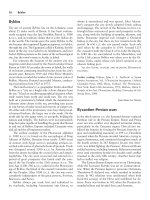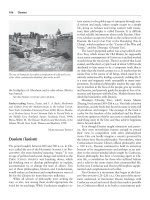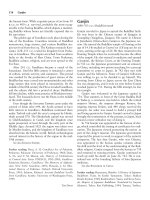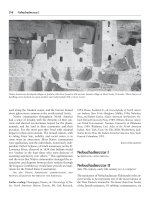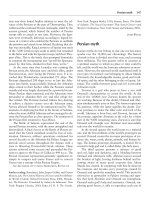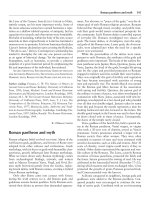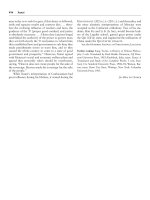Encyclopedia of world history (facts on file library of world history) 7 volume set ( PDFDrive ) 132
Bạn đang xem bản rút gọn của tài liệu. Xem và tải ngay bản đầy đủ của tài liệu tại đây (64.34 KB, 1 trang )
Although briefly forbidden during the Qin (Ch’in)
dynasty, Han Wudi (Han Wu-ti), the sixth emperor of
the Han dynasty embraced Confucianism. He adopted
the principles of Confucian thought as the basis for his
government, laws, and ethics. In order to promote it he
started a university to teach the Confucian Classics to
new generations. Confucianism remained the most influential and mainstream school of thought in the China
until the Chinese Communists led by Mao Zedong (Mao
Tse-tung) stamped it out.
Zhu Xi (Chu Hsi) undertook further elaboration of
Confucianism as a state ideology, and he was indentified
as one of the first Neo-Confucians. Neo-Confucianism,
which was more appealing not only to China but also to
Korea and Japan, incorporated Daoism (Taoism) and
Buddhist ideas to create a more all-encompassing philosphy and ideology. The two most fundamental principles
of Confucian governmental thought are virtue and merit.
In order to govern one must first be able to successfully
govern himself. As a result, the king or leader of a government must act as a “calm center” around which society is able to develop and prosper under his direction.
Confucian thought stresses learning as an integral
component of not only better governing oneself but
also improving one’s chances for success within society.
When later dynasties began to implement Confucian
governmental principles, they established civil services
exams for government positions, based upon the study
of the Confucian Classics. In addition, they also incorporated traditional values of ritual, filial piety, loyalty,
community, and humaneness. Confucianism still influences many Asian nations.
Further reading: Berthrong, John H., Evelyn Nagai Berthrong, and E. Nagai-Berthrong. Confucianism. Oneworld
Publications, 2000; Elman, Benjamin A., John B. Duncan,
and Herman Ooms, eds. Rethinking Confucianism: Past and
Present in China, Japan, Korea, and Vietnam. Los Angeles:
UCLA, 2002.
Arthur Holst
Confucius
(551–479 b.c.e.) Chinese philosopher
Confucius is the Latinized form for Kong Fuzi (K’ungfu-tzu) which means Master Kong in Chinese. He
came from a minor noble family from the state of
Lu in modern Shandong (Shantung) Province, which
had been founded by the Duke of Zhou (Chou).
Confucius
93
His father died when he was young, and his mother
brought him up under humble circumstances. Confucius founded a school of philosophy called Confucianism, which stressed ethics in personal and political
life and which contended for acceptance during the
era called the Hundred Schools of Philosophy in
China that lasted between approximately 600 and 300
b.c.e. By 100 b.c.e. Confucianism had become China’s
state ideology, and Confucius was acknowledged as the
Supreme Sage and Ultimate Teacher. Few people have
had a greater impact on more people for two millennia.
Although many legends have grown around Confucius in later centuries, it is nevertheless possible to reconstruct a fairly accurate biography of him. Confucius
had an education fitting for a gentleman. His hobbies
were music and archery, but he had to make a living. He
sought government service, but with a mission, which
was to reform morals and bring peace. China was in an
unstable state. The Zhou dynasty was in decline, and
the feudal lords who were contending for supremacy
paid little attention to moral leadership. Thus, he had
little luck finding acceptance for his ideas and turned to
teaching as an instrument for reform. He was China’s
first professional teacher, charging tuition, but only accepting students of integrity. Whereas traditional schools
for nobles turned out educated men who did their lords’
bidding, Confucius expected his students to play a dynamic role in reforming the government and serving the
people. He taught more than 3,000 students, among
them 72 were counted disciples. Most of his students
went on to teach and further his legacy, spreading his
ideals and debating followers of other philosophies.
Confucius wrote a book titled the Annals of
Spring and Autumn (Qunqiu), which was a chronicle
of his state of Lu. The book’s title gave its name to the
era it covered. Its importance was his choice of words
to describe people and events, called the “rectification
of names,” that conveyed censure or praise. According to the famous Confucian Mencius: “Confucius
wrote the Spring and Autumn and rebellious sons and
disloyal ministers were overwhelmed with consternation.” This book, together with the Yi Jing (I Ching),
or Book of Change; Shu Jing (Shu Ching), or Book of
History; Shi Jing (Shih Ching), or Book of Poetry; and
Li Jing (Li Ching), or Book of Rites, constitute the
Five Classics of the Confucian Classics and are the
most revered texts of the Chinese culture. Confucius
and his disciples are credited with compiling and editing the other Four Books of the canon and also writing
appendices to them. One of these, Lunyu (Lun-yu), or
the Analects, which means “selected sayings,” was a

